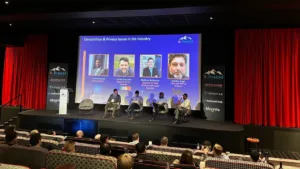By Jeff Norton, author
Between Facebook’s recent rebranding and Microsoft’s just-announced acquisition of Activision Blizzard, you’d be forgiven for thinking the future was upon us and we’re already living in the so-called metaverse. In many ways, the pandemic has accelerated the transition towards global digital interfacing, but the future internet is still being conceptualized, experimented with, and assembled from work-in-process blueprints. But the thing about the future is that it can come at you pretty fast. Therefore it’s prudent to prepare and to explore where the opportunities and threats lie in the future evolution of the internet, a metasphere of VR, AR, mixed media, and decentralized computing.
As the author of a fictional step into one possible interconnected future, there are elements of my MetaWars novels that offer a glimpse into what the metaverse may have in store.
Making the Scarce Scalable
One of the biggest opportunities of a global, virtual platform is to unshackle experiences from the limits of physical space and geography. This will change the game for the performing arts, live events, and sports. Hitherto, a play, performance, or concert could only be performed live in front of a defined few. And this scarcity creates value. Exhibit A: the price of tickets to see Springsteen on Broadway. The National Theatre figured out how to stream its performances into select cinemas to broaden the base of its audience and decouple the performance from the physical space.
But a global platform can enable a global audience, and while the price to access an event virtually may be lower than the real world, the quantity of tickets sold can be infinitely more. And since revenue is simply P x Q: price times quantity, the revenue potential of moving from the scarce to the scalable is immense. Add in a subscription model, and you’ve got a formula for recurring revenue based on something that in the real world could only be mounted a limited number of times.
We’re seeing 2D examples of this from Hamilton on Disney+, the Masterclass brand, and yes, even Springsteen On Broadway…on Netflix. The metaverse will offer more immersive, more interactive virtual experiences that won’t replicate the real, but can certainly offer compelling substitutes.
The trick will be to create experiences that are compelling enough to compete for the world’s most scarce resource: our time and attention. Like a new film at the cinema, a big sporting event, or a new show on Netflix, everything is vying for consumers’ attention. And an online experience – however immersive – is no different.
The arts, sporting events, and lectures can all be transported into a meta environment for more people to enjoy and engage with. The form will evolve over time, but early experiments are abundant, from concerts in Fortnite to VR conferences. Experimentation and iteration will yield new forms of experiences, ones that eventually reach beyond the core gamer cohort and typical early adopters, eventually becoming as mass market.
Communities of Interest
From virtual book clubs to opportunities for debate and discussion, an optimistic view of the metaverse is that it can enable like-minded people to find each other without the constraints of geography. While you may have a very niche interest, on the internet, it’s possible to find your people. Of course, we’re already doing this. My father plays on-line bridge with players around the world, effectively in a type of card playing metaverse. My two sons find each other in Minecraft and collaborate on various buildings. And my mom has rediscovered old friends from high school through social media. The metaverse technologies will offer more immersive opportunities for interaction, which should generate richer and more meaningful experiences.
The dark side of this, of course, is the continuation of self-constructed echo chambers; seeking a positive feedback loop for your own world views and prejudices. I have to believe that somewhere in a corner of the metaverse right now are hard-left communists conspiring to bring down capitalism as well as far-right xenophobes bent on instigating the second American civil war. While the rights of free speech should be maintained in the metaverse, we can’t be blind to the fact that some people will attempt to use the virtual sphere as their own Bavarian beer hall.
Journalist Louise Eccles’ recent piece in the Sunday Times was a cautionary tale of men behaving badly in the virtual realm. The cloak of anonymity seems to bring out our worst instincts, leading some users to say and do things they wouldn’t dare at a cocktail party or in front of their grandmother. Big Tech and individual users alike need to be vigilant against hate speech, racism, misogyny that seems to run all to rampant on the internet; especially when users can hide behind anonymous avatars.
The Future Is What We Make It
We are in uncharted waters now. The past twenty or so years of the internet will provide some guide to what’s in store, but users, platforms and hardware makers can and should navigate by the north star of creating a metaverse that offers something better than what’s come before. If we can will that into existence, the opportunities will be limitless.
Jeff Norton is the author of MetaWars: Fight For the Future (Hachette, 2012), its three sequels and six other novels. He is also a successful film & television producer and the founder of IP and production company Dominion of Drama. He is online at www.jeffnorton.com and tweets as @thejeffnorton.









